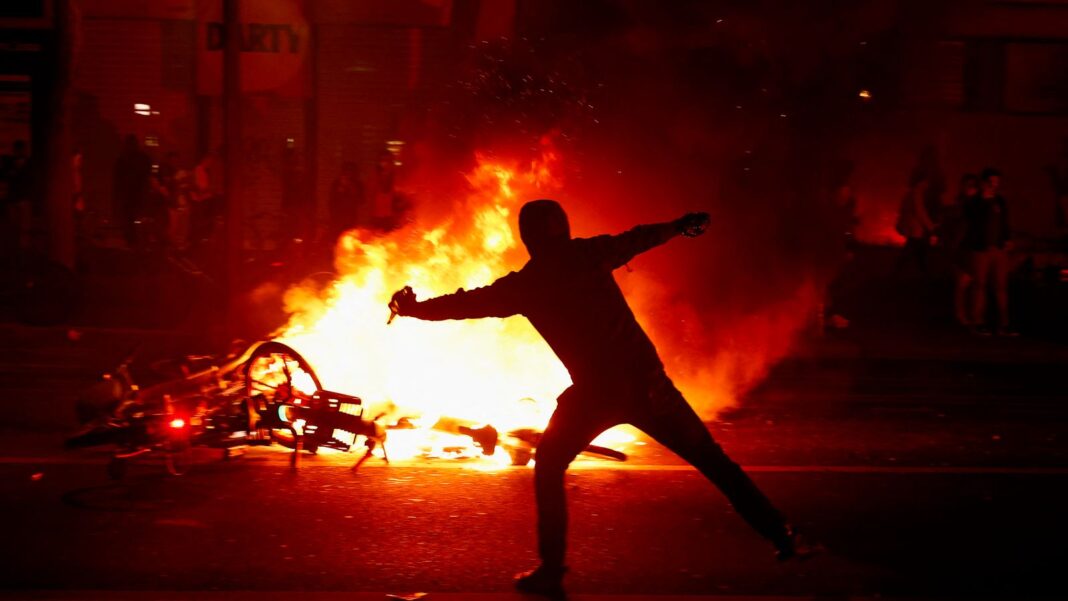Emmanuel Macron has refused the resignation of France’s prime minister after the country’s parliamentary election results left the government in limbo.
The French president has asked Gabriel Attal to remain in office temporarily “in order to ensure the country’s stability,” Mr Macron’s office said.
Follow latest: France braced for ‘instability, political chaos and gridlock’
Mr Attal – a member of Mr Macron’s Renaissance party – had offered his resignation following the election results.
“Even though we had three times better results than being envisaged, it doesn’t mean that it’s a majority,” he said on Sunday.
“So, faithful to the Republican tradition, I will actually withdraw tomorrow morning.”
Gabriel Attal offered his resignation. Pic: Reuters
Marine Le Pen’s far-right party was being tipped to emerge as the dominant force in French politics following Mr Macron’s decision to hold a snap poll.
But the left-wing New Popular Front coalition (NPF) won the most seats (182) in the second voting round of parliamentary elections.
Mr Macron’s centrist group, Ensemble, won 163 seats with National Rally (RN) in third on 143 seats, according BFM TV.
After RN emerged from the first round of voting as the leading party, centrist and leftist parties agreed to withdraw 221 candidates, including 83 from Mr Macron’s camp and 132 from the NPF, in order to avoid three-way run-offs.
Who will be the next prime minister?
It’s rare for a prime minister to resign, and even rarer for the resignation to be turned down.
Whatever his misgivings about doing the job, Gabriel Attal will have to continue after his boss, the French President Emmanuel Macron, refused to accept his decision.
Why? Macron needs some sense of stability at the top of French politics, especially with the Olympics around the corner.
And, in the absence of a deal with his opponents, who else would do the job now, as the lamest of lame ducks?
Jean-Luc Melenchon, the leader of La France Insoumise, would like to be prime minister, but is incredibly unlikely to get the support of other left-wing parties, let alone Macron, who can’t stand him.
But the president will have to strike some kind of alliance, and that will almost certainly mean a prime minister drawn from the ranks of the Socialists.
It could herald a remarkable comeback for Francois Hollande, the former president, but I’m told that Francois Ruffin and Raphael Glucksmann, younger party stalwarts, may be more popular options.
An outsider, though, is the leader of the Greens, Marine Tondelier, who is considered an astute and engaging operator.
Le Pen said RN’s victory had “merely been delayed”, adding that she “sees the seeds of tomorrow’s victory in today’s result”.
She also described Mr Macron’s position as “untenable”.

President Emmanuel Macron rejected the PM’s resignation. Pic: AP
Jordan Bardella, president of National Rally, said: “We’ve been thrown into the arms of the extreme left and of Jean-Luc Melenchon.”
Please use Chrome browser for a more accessible video player

0:52
Fireworks light up Paris as crowds celebrate
He said the coalitions formed in response to RN’s success in the first round had “paralysed” the French political system and Mr Macron had “pushed the country towards uncertainty and instability”.
“I know how many millions of French people must be frustrated,” he added.

Jean-Luc Melenchon, founder of the far-left party La France Insoumise (France Unbowed), speaks on Sunday night. Pic: AP

Supporters of National Rally looking glum after the exit polls were announced. Pic: Reuters
Mr Macron’s office said: “The president, as guarantor of our institutions, will respect the choice of the French people.”
It also said he was analysing the results and waiting for the full picture to emerge.
Some clashes were reported in Paris between protesters and riot police after the results.

There were some clashes in Paris after the results. Pic: Reuters
France is now on course for a hung parliament, divided between three sizeable groups, unless the left can strike deals with other parties.
The NPF – just under a month old – is a broad left-wing electoral alliance.

Clockwise from left: Emmanuel Macron, Jordan Bardella, Marine Le Pen, Gabriel Attal
Read more:
France is now in a state of flux
Who is the hard-left leader dubbed ‘France’s Jeremy Corbyn’?
What the result means and how a new govt can be formed
It was launched on 10 June in response to Mr Macron calling the snap election.
It comprises La France Insoumise (France Unbowed), the Socialist Party, Les Ecologistes, the French Communist Party, Generations, Place Publique, and several other left-leaning parties and groups.
France Unbowed is the largest party in the NPF.
Please use Chrome browser for a more accessible video player

1:51
Far-right National Rally ‘in third place’
Although the NPF has no official leader, Mr Melenchon is widely thought to be the closest person to that.
It has been a volatile campaign, with more than 50 candidates reporting being physically attacked.
Over 30,000 police were deployed on voting day.







